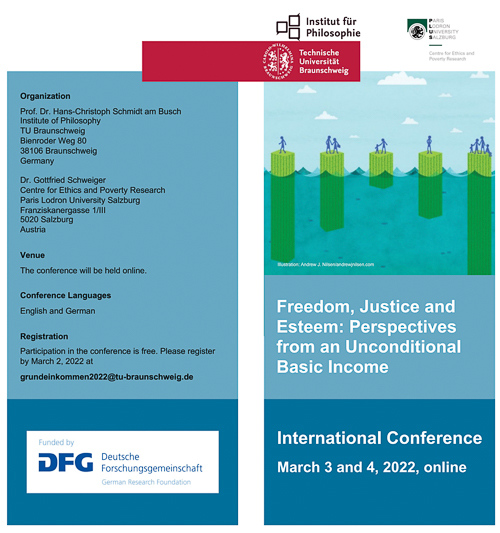
by Peter Knight | Mar 5, 2022 | News
Eight, a NGO that provides Unconditional monthly cash transfers to people in extreme poverty for two years, in collaboration with IPIS, the Belgian Development Cooperation, Fairphone, Umicore and Proximus, announces the expansion of its basic income pilot project in the Democratic Republic of Congo (DRC). From 2022 to 2026, following the first village that was onboarded in October 2021 in Lutala, the project will scale up in the same region (in the Kalima, Maniema province), providing the entire region with a basic income boost – or unconditional cash transfers – for two years.
Read more about the project expansion in this press release.

by Peter Knight | Mar 2, 2022 | Events, News
The Nordic Basic Income Earth Networks have published a common pamphlet featuring nine articles. With this pamphlet, they urge the Nordic governments to introduce universal basic income and show a roadmap for a more just and sustainable world, as well as a more democratic economy.
Download the pamphlet.
See the videos of the international Nordic BIEN conference, where the pamphlet was published.
Credit for cover illustration: Jan Jäger

by Peter Knight | Feb 28, 2022 | Events, News
The first episode of the year in the Social Protection Podcast brings a radical proposal for extending social protections: the Universal Basic Income, or UBI.
Fundamentally, a universal basic income is a benefit provided in cash without conditions to everyone. It is a large topic that has been generating heated discussions in the social protection field for many years now. In that sense, we divided this discussion into two episodes.
This episode focuses on the UBI and the World of Work. Fears around automation and the changing nature of work fuel popular and policy interest in the UBI. But the prevailing narrative that welfare makes people lazy and less inclined to work may be one of the biggest obstacles to overcome if a UBI is ever to be achieved.
The episode unpacks the evidence around whether a UBI could change the way we value work and what that could mean for gender equality and workers’ bargaining power. It also looks at how arguments for and against the UBI play out across the political spectrum.
In the second episode, the discussants reflect on the ways UBI fits in with social protection systems. The truth is that despite many pilots and trials in countries as diverse as Kenya, Canada, and Finland, no country has managed to implement a full UBI. Drawing from these experiences, we address what is commonly the number one objection to making UBI a reality – namely, cost. More specifically, we delve into aspects of affordability (How can countries finance it? How generous should it be?), equity (How to address specific deficits?), and, ultimately, its feasibility (Can it ever be achieved?).
The discussants for both episodes are:
- Francesca Bastagli, Director of the Equity and Social Policy program and Principal Research Fellow at ODI.
- Jurgen De Wispelaere, Assistant Professor at the Stockholm School of Economics in Riga and Adjunct Professor in Philosophy of Social Policy at Tampere University

by Peter Knight | Feb 23, 2022 | Events, News
Unconditional basic income continues to be a subject of lively debate – both in academia and in the public and political spheres. From a philosophical and social science perspective, the questions it raises are: Would such an income increase our individual freedom? What impact would it have on fundamental forms of social esteem? And could it be consistent with notions of justice based on reciprocity? These systematic questions will be discussed at the conference, taking into account relevant historical and theoretical developments.
Conference website: https://www.tu-braunschweig.de/en/philosophie/basic-income
Conference Languages: English and German
Venue: The conference will be held online. Links will be sent after registration.
Registration: Participation in the conference is free. Please register by March 2, 2022 at
grundeinkommen2022@tu-braunschweig.de
Program:
March 3, 2022 (all times are CET – UTC+1)
11–11.30 Hans-Christoph Schmidt am Busch, Gottfried Schweiger: Welcome
11.30 –12.40 Matilde Cazzola (Frankfurt am Main): Beyond Poverty and the Coercion of Work: Thomas Spence and the Redistribution of Quarterly Dividends
2–3.10 Silke Bothfeld (Bremen): Eignet sich ein bedingungsloses Grundeinkommen für die nachhaltige Förderung individueller Autonomie? Ein Kommentar aus der Perspektive der Sozialpolitikforschung
3.30–4.40 Jürgen Schupp (Berlin): Das 2021 gestartete Pilotprojekt Grundeinkommen in Deutschland: Zum Stellenwert sozialwissenschaftlicher Feldexperimente
5–6 Philippe Van Parijs (Louvain): Prospects and Challenges for an Unconditional Basic Income: A Conversation with Philippe Van Parijs
March 4, 2022
9.30–10.40 Malcom Torry (London): Basic Income: A Brief History of the Idea
10.50–12 Peter Sloman (Cambridge): Redistribution or Revolution? Basic Income and Radical Politics in Britain, c. 1918-1950
1–2.10 Olavi Kangas (Turku): Possibilities to Plan and Implement Large Scale Social Experiments – Some Lessons from the Finnish Basic Income Experiment
2.10–3 Hans-Christoph Schmidt am Busch, Gottfried Schweiger: Final Discussion and Farewell






